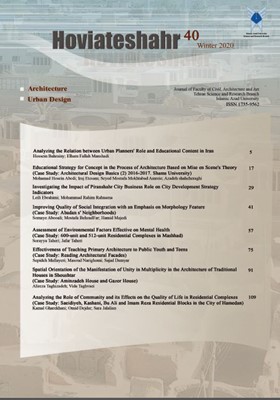Analyzing the Relation between Urban Planners' role and educational content in Iran
Subject Areas : urbanismسید حسین بحرینی 1 , Eham Fallah Manshadi 2
1 - استاد گروه شهرسازی، پردیس هنرهای زیبا، دانشگاه تهران
2 - PhD of Urban Planning
Keywords: Educational Content, Developing Countries, Urban Planners' Role, Iran, Urban Planning Education,
Abstract :
A review of the literature on the subject of urban planning education in the developing countries shows serious challenges in formulating the content of education in these countries. One subject is the relation between content of education in these countries and the role that planners play. No doubt the education content of what planners need should be in congruence with the professional role and position of planner in the society. In other words, before defining the education content, we should make it clear what kind of planner we intend to train and what do we expect of this planner to do. On these basis, this critical question may raise that what role urban planner essentially play in the developing countries and to what extent the content of education in these countries should adapt to this role? A brief review of the literature indicates that two general roles of active vs. advisory (or technician role) have been dominant in urban planning. Choosing between these two would imply different education content. The education content consists of three elements of knowledge, skills, and values, each of which has its own unique details. The importance of these sub-elements is different in different roles of planners. In the active role, the main knowledge needed is substantive/fundamental, the most important skill is communicative, and it is value or normative based. In the case of technician role, on the other hand, the dominant knowledge is procedural / applied, skills are technical and analytical and values are not important. In this article, the role of urban planner in Iran, as a developing country, will be analyzed, and, then, the most important knowledge and skills which are relevant to this role will be defined. In other words, this study intends to find answers to the following questions: What is the role of urban planner in Iran, as a developing country? What are the most important knowledge and skills needed by urban planners in developing countries? And finally to what extent the related educational contents are prioritized on the basis of actual role of planner? The study of planner role in the developing countries, and Iran as a case study, shows that the dominant view for the planner role is technician or advisory role in the decision-making process and the main focus is on preparing urban development plans at different scales (from national spatial planning to specific detailed plans). Planners are actively involved in physical studies. Reflection of the planner role on the education content in the developing countries shows the dominance of procedural / applied knowledge which are courses with physical orientation such as studios, urban space analysis, introduction to urban planning, urban design methods and GIS (versus environment, economics, social issues), and technical and analytical skills(versus communication skills) and values do not play any role in this regard. These results shows that there is a conformity between urban planner's role and educational content in Iran as a case study for developing countries.
_||_


